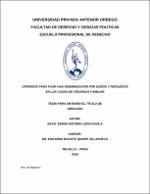| dc.contributor.advisor | Quispe Villanueva, Edgardo Bagate | |
| dc.contributor.author | León Dávila, Edwin Antonio | |
| dc.creator | León Dávila, Edwin Antonio | |
| dc.date.accessioned | 2016-09-05T17:30:06Z | |
| dc.date.available | 2016-09-05T17:30:06Z | |
| dc.date.issued | 2015 | |
| dc.identifier.uri | https://hdl.handle.net/20.500.12759/1832 | |
| dc.description.abstract | Como sabemos los casos de la violencia familiar en el Perú se han incrementado durante el periodo 2010 – 2013, siendo la gran mayoría de sus afectados las mujeres. Dicho incremento también se debe también a la deficiencia y vacíos existentes en la Ley N° 26260; conforme es de verse en el contenido de las sentencias de Violencia Familiar. De otro lado, el incremento de dichos actos se debe al factor de reincidencia; situación en la que si bien existe una sentencia que sanciona penalmente al agresor, este continúa ejerciendo la violencia en contra de su víctima.
Ante tales hechos, consideramos que –paralelamente a las sanciones penales que se le puede imponer al agresor- también se le debe permitir a la víctima, acceder adicionalmente al monto de la reparación civil la cual en la mayoría de casos es irrisoria, a un monto de indemnización por los daños tanto físicos como psicológicos a los que fue sometido conjuntamente con terceros, tales como son los hijos menores de los esposos o convivientes.
En consecuencia, el presente trabajo investigación está orientado a fundamentar la necesidad de regular la indemnización derivada de la responsabilidad civil extracontractual en los casos de violencia familiar en la legislación peruana. | es_PE |
| dc.description.abstract | As we know the cases relating to family violence have been increasing during
the period 2010 - 2013, the vast majority of those affected by domestic violence
are women. This increase was also due to the deficiency and / or gaps in the
existing Act No. 26260; reflecting this reality in the content of the judgments of
Family Violence, which suffer from certain points, which are set out in Article 21
of the TUO of that legislative body. Furthermore, the increase of such acts must
factor recidivism; being the most worrying for our society, because although
there is a statement that a criminal offense the offender, this continues to exert
violence against the victim.
Given these facts, we believe that -paralelamente to criminal sanctions that can
be imposed on the aggressor you must also enable the victim, quite apart from
civil damages (which in most cases is minimal), is granted compensation for
damages for the physical and psychological damage that was submitted; This
for the reason that the victim is checked, since there is no compensation for the
victim and others, such as minor children are spouses or partners.
Consequently, the present research work is oriented to the need to regulate the
compensation arising from civil liability in cases of family violence in Peruvian
law, which will be detailed in the following lines of this report | en_US |
| dc.description.uri | Tesis | es_PE |
| dc.format | application/pdf | es_PE |
| dc.language.iso | spa | es_PE |
| dc.publisher | Universidad Privada Antenor Orrego - UPAO | es_PE |
| dc.rights | info:eu-repo/semantics/openAccess | es_PE |
| dc.source | Repositorio Institucional UPAO | es_PE |
| dc.source | Universidad Privada Antenor Orrego | es_PE |
| dc.subject | Daños y perjuicios | es_PE |
| dc.subject | Violencia familiar | es_PE |
| dc.title | Criterios para fijar una indemnización por daños y perjuicios en los casos de violencia familiar | es_PE |
| dc.type | info:eu-repo/semantics/bachelorThesis | es_PE |
| thesis.degree.level | Titulo Profesional | es_PE |
| thesis.degree.grantor | Universidad Privada Antenor Orrego. Facultad de Derecho Y Ciencias Politicas | es_PE |
| thesis.degree.name | Abogado | es_PE |
| thesis.degree.discipline | Derecho | es_PE |

